NURSING
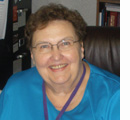 Marcella Choate | Rehabilitation Institute of Kansas City
Marcella Choate | Rehabilitation Institute of Kansas City
She was recently divorced and raising two children in Nebraska when the accident left her quadriplegic, capable of little more than shoulder shrugs. But she wanted to get out of institutional care and go home to her kids. That was the setting for Marcella Choate’s introduction to rehabilitative care. Choate worked with another nurse to get that woman into an apartment where, with in-home care, she was able to raise those children to adulthood. In any rehab professional’s book, that’s a win. “She taught me so much about what she needed,” Choate says. “The patient taught the nurse; it was kind of a two-way street. She also taught me that there are a lot of things in the way of people with disabilities.”
Choate’s career eventually brought her to the Rehabilitation Institute of Kansas City, where’s she’s been involved in nursing and administrative roles for 35 years. There, says president and CEO Don Harkins, Choate has demonstrated the wisdom of Solomon and the patience of Job. Both qualities are in demand there. The institute specializes in treating some of the most difficult medical cases in the region. Every year, Choate is responsible for managing the admissions of more than 2,000 patients who have experienced stroke, brain or spinal-cord injuries, neurological maladies and other conditions.
Often, they present not just issues of medical treatment and care. The damage also may be psychological, social, work-related, familial and even financial. Successful treatment, Choate says, rests on two primary factors: a nurturing, supportive family, and education that cuts across all levels: “What I found important in rehabilitation was with the education of the individual, making rounds with the doctor to understand where the doctor was coming from, and communicating with family,” Choate said. “Constant communication between nurse, staff, physician and family is very helpful to a successful outcome.”
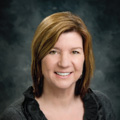 Salena Gillam | Stormont-Vail HealthCare
Salena Gillam | Stormont-Vail HealthCare
“I came to nursing with one desire: to comfort patients and their families,” says Salena Gillam, director of progressive care at Stormont-Vail HealthCare. “From my own experiences with illnesses in one of my family members, I appreciated the kindness of the nurses I had contact with,” she says. “I remember thinking, ‘I want to do that for someone someday.’ ” She said she realized early on that she had a natural affinity for providing care to acutely ill adult patients and that her place was in the acute-care environment serving patients during their most vulnerable times. Gillam manages the operation of more than 200 inpatient beds and leads a nursing management team of seven in-patient departments (cardiac, oncology, medical and post-surgical services, among a multitude of other responsibilities.
“I had not been a nurse for long when I realized that leadership was the path I would follow,” she says. “I wanted to create an environment where nurses could do their best work. This environment would focus on education, teamwork, mentorship and respect.” With 27 years of nursing experience, Gillam believes education and sharing knowledge help to better nursing programs within hospitals. “I would not have made it through the challenges of my career without the teaching, collaboration and support of talented physicians and nurses that I have worked with,” she says.
She says she makes it a priority to develop managers and charge nurses who are on the “front line facing daily challenges in health care.” She supports them and enables them to develop strong decision-making skills: “I teach them that if they always do what is right for the patient, they will always have made the best decision,” she says. “As they have successes, I see growth of confidence in them. There is nothing more rewarding than witnessing those successes.”
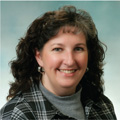 Lisa Cavin-Wainscott | The Birth Place, Olathe Medical Center
Lisa Cavin-Wainscott | The Birth Place, Olathe Medical Center
High-school aptitude tests aren’t always spot-on, and such was the case for Lisa Cavin-Wainscott. “Although my high-school career test said that being a ‘railroad brake operator’ was the job for me, I knew that I enjoyed health and biology,” says Cavin-Wainscott, an Olathe Medical Center clinical nurse specialist at The Birth Place.
Inspired by the book “On Death and Dying” by Elisabeth Kubler-Ross, Cavin-Wainscott initially wanted to be an oncology nurse. But her work in the NICU at Vanderbilt University Medical Center during nursing school raised her interest in obstetrics and bereavement programs. “I always thought that I went to the other end of the spectrum, from oncology to obstetrics, but now that I’ve specialized in perinatal bereavement, I believe my career has really come full-circle,” she says. When what is arguably one of the hardest things for a family to go through happens—the loss of a baby—Cavin-Wainscott is there to provide guidance. “My role is to validate their feelings,” she says, “tell them what to expect next, let them know what their choices are, and support them while they process their thoughts and feelings.” Some of that guidance even includes helping couples plan funerals. “No one can take away their pain,” says Cavin-Wainscott, “but my goals are always to put some nice memories beside the bad ones and to have them leave the hospital being comfortable with the choices they have made for their baby and for themselves.” One of the most profound situations of her career in health care was when a group of new employees was touring The Birth Place. “A woman approached me in the hall and asked if she could speak with me for a moment,” Cavin-Wainscott says. “She explained that I had cared for her five years earlier when her baby died.” The woman told Cavin-Wainscott that she had inspired her to become a nurse.
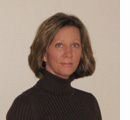 Cindy Edwards | Research Medical Center
Cindy Edwards | Research Medical Center
At just 11 years old, Cindy Edwards had a goal to grow up and be someone who could make a difference. “When I was in the fifth grade, my father was diagnosed with an acute leukemia and died within a week of being admitted to the hospital, of a cerebral hemorrhage,” she says. “As a kid, I was sad and fearful. I remember wishing I could somehow know what to do to help.” A few years after her father’s death, Edwards started as a candy striper at Research Medical Center. “After high school, I decided to go to nursing school and went through Research’s program,” she says. “I started working there immediately after graduation.”
It’s been 31 years, and Edwards is still at Research as neurosurgical charge nurse. She assists with the operating-room set up, lining up staff and collecting supplies, talking with patients and their families before surgeries, and troubleshooting problems. Handling the stress of the OR is “really a matter of keeping your eye on the ball,” she says. “I personally thrive on intense situations and feel a great sense of accomplishment when, as a team, we handle a daunting situation in the OR.”
During her career with the hospital, Edwards has worked in the ICU, as part of a trauma team, open-heart surgical team and now with neurosurgery, a specialty she says has been the most fun and fascinating. “One of the most satisfying parts of my job comes when difficult or complicated cases go well for our patients,” she says. “No matter what the final outcome is for my patients, I feel confident that they could not have received better care anywhere, and that speaks to my goal at 11 years old of making a difference.”
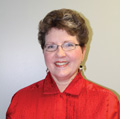 Donna Adams-Crahan | Women's Care Clinic, Saint Luke's Health System
Donna Adams-Crahan | Women's Care Clinic, Saint Luke's Health System
Donna Adams-Crahan, clinic nurse manager at Saint Luke’s Women’s Care Clinic, chose nursing because she enjoys caring for others—especially moms and babies. “Obstetrics is a specialty, but pregnant ladies have the same medical and surgical issues as the general population, so I always had the best of both worlds in patient care,” she says. The Women’s Care Clinic sees a lot of patients who are “typically disadvantaged, young or older, have multiple social issues and often are in need of coping skills,” Adams-Crahan says. The clinic provides resources, obstetrics care, education and support to patients.
In her management role, Adams-Crahan says she works hard to keep the staff informed on what’s happening with the clinic, hospital and Saint Luke’s system, as well as being available for support. “I have a lot of confidence in my staff, and I try to let them solve their own problems,” she says. “I try to facilitate and help my staff grow.”
Although much of Donna’s responsibilities are management-related, she said she has direct contact with patients as well. “I still have some hands-on clinical time with the diabetic OB patients,” she says. “I’ve done this for years, and I particularly enjoy the educational piece.”
Her favorite aspect of it all? “The most satisfying part is seeing the mostly happy outcomes of healthy babies for our patients,” she says. “It’s great to see a mom bring her baby back to show us and tell us how she and the baby are doing.”
Adams-Crahan also stays in close touch with many of her former patients, including one whose photography she sees every day. “I have a picture on my fridge of a baby who ‘wouldn’t possibly survive,’ according to physicians treating mom for preterm rupture of membranes,” she says. “He is a teen now and doing well.”
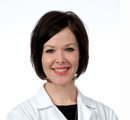 Sue Ellen Breese | Kansas City Cancer Center–University of Kansas Cancer Center
Sue Ellen Breese | Kansas City Cancer Center–University of Kansas Cancer Center
Sue Ellen Breese, adult nurse practitioner at the Kansas City Cancer Center–University of Kansas Cancer Center, draws inspiration from her faith; her mother, a nurse who worked in an Army ICU; and her grandparents, three of whom died from cancer. As past co-chair of KCCC’s Palliative Committee, Breese helped develop an end-of-life care and advanced-care planning program while leading the palliative care team. “I see palliative care every day in my practice, which confirms that my role goes beyond the physical and, rather, demands the emotional and spiritual aspects to be examined and respected,” she says.
Although many of the patients within Breese’s oncology specialty are suffering, she gathers much encouragement from them. “It is strange how what I do on a day-to-day basis can actually benefit me,” she says. “I am humbled by the strength and grace my patients show.” Breese said she often thinks specifically of three past patients concurrently suffering from metastatic breast cancer who were “strong, faith-filled women.” All three women died within weeks of each other, she says. “It was a very difficult time for me when they died, but each woman gave me such joy and perspective on life.”
In addition to her local community involvement [with Northcare Hospice House, Relay for Life, Race for the Cure, with her church and at City Union Mission], Breese has also traveled abroad to help with medical mission trips. She has traveled to Jamaica, Guatemala and Banda Aceh, Indonesia. “Any service, especially to a third-world country, affects you in profound ways, both professionally and personally,” she says. “I believe the trips have enabled me to love and care for people more freely and genuinely—desiring to know their stories, understand their human spirit and be creative [using what I can] in how I can best care for them.”